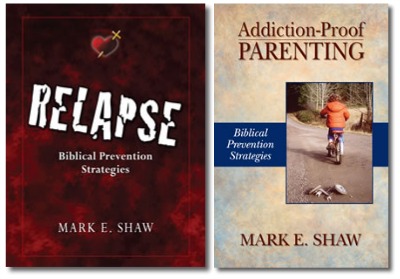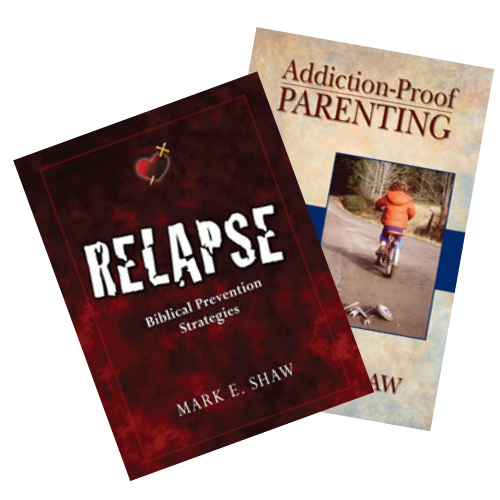 While many of my books and booklets have a focus upon substance abuse issues, a struggle with any “addictive” pleasure of sin is a war within one’s heart desires. Anything pleasurable on this earth can become enslaving so the applications are manifold.
While many of my books and booklets have a focus upon substance abuse issues, a struggle with any “addictive” pleasure of sin is a war within one’s heart desires. Anything pleasurable on this earth can become enslaving so the applications are manifold.
Two of the books I wrote address the mind of an addict to address the desires within anyone engaged in the struggle:
- Relapse: Biblical Prevention Strategies, which is written in workbook style, directed to the person in the struggle, and
- Addiction-Proof Parenting, written to parents, which paints a picture of how the messages we send our children either direct their thinking to be self-centered or Christ-centered.
5 Mentalities of “Addiction”
Because I like to keep things simple, I’ve identified five mentalities which often manifest in the hearts of those who battle addiction. (I prefer to not use the word “addiction” in the same way the world describes the problem as a “compulsive disease” so I redefine it to reflect biblical truth as a “habitual, sinful heart” issue.) With that in mind, there are certain mindsets that are evident in those who are seeking to please self above anyone else.
In Relapse: Biblical Prevention Strategies, the person in the struggle can address the mentalities which are each described within the context of the workbook in practical detail. A mentality is simply an “outlook” or “way of thinking,” so the book is about changing one’s outlook and perspective from one that is self-centered to become more Christ-centered.
When I counsel, I often see them in a progressive order as outlined below (each of them has an application example of those justifying their sexual sin):
- Entitlement mentality: “It belongs to me. I own it” (opposite of Matthew 22:37-38). Often, controlling persons who look at porn and people as objects to be used rather than as living souls might fall into this mentality.
- Consumer mentality: “I want to spend all of it on myself” (opposite of Matthew 22:39-40). Takers rather than givers often get involved in sexual sin seeking to please self. God ordained sex in marriage to be a mutual blessing.
- Victim mentality: “It’s not my fault” (Ephesians 5:18). “I’m not hurting anyone” is the incorrect idea that permeates this mentality. It is a view that I am not doing anything wrong or if I am, it’s not my fault because someone (i.e. boss or spouse) made me angry enough to do this.
- Perishing mentality: “Woe is me. Nothing good happens to me. My spouse is not treating me the way I want to be treated” (Ephesians 5:19-20). The “never satisfied” person who is always searching for more and because sin does not satisfy, the person is always increasing in perversion.
- Rebellious mentality: “I can do what I want. I am my own boss” (Ephesians 5:21). This person abhors restrictions unless self-imposed and thinks thoughts like “no one tells me what I can and can’t do on the Internet with my time.”
The progression starts when one thinks in an entitled way and he is failing to trust and love God with all of their heart, soul, and mind by acting as a “god” in charge of his own life. This mindset leads to an addictive thought process of a rebel who says in their heart “there is no God” and “I can, therefore, do what I want.” In the books, I explain the progression of this mindset because all five can be interconnected.
Persons enslaved to pornography or any type of so-called addiction will often find one or more of these mindsets behind their sinful choices. It is important to examine one’s heart as much as possible though it is better to have a disciple-maker, trusted Christian friend, biblical counselor, or accountability partner to point out when you are thinking in one of these ways. Proverbs 27:5-6 states a truth many of us prefer to ignore: Better is open rebuke than hidden love. Faithful are the wounds of a friend; profuse are the kisses of an enemy. As a biblical counselor and someone who has worked in residential programs for addictions, I know this to be true in that my best counselors are often those who are willing to say the hard things in a gentle spirit to a blinded counselee. We call that “speaking the truth in love” (Ephesians 4:15-16).
As a counselor, when I hear a counselee reflecting an ungrateful attitude, especially toward his spouse, it is a signal to me that the counselee is headed toward a fall because it is what I call the “perishing mentality.” A lack of thankfulness is a clear indication to me that my counselee is dwelling on the opposite of Philippians 4:8: “Finally, brothers, whatever is true, whatever is honorable, whatever is just, whatever is pure, whatever is lovely, whatever is commendable, if there is any excellence, if there is anything worthy of praise, think about these things.”
Let these five mentalities be a way for you to evaluate your own heart and thoughts as compared to what God calls you to be: humble, giving, responsible (obedient), grateful, and submissive.
5 Godly Mentalities
Five Christ-centered replacement mentalities are described and taught in the text as well: Be Humble, Be Giving, Be Responsible (or increasingly obedient), Be Grateful, and Be Submissive. All of these mentalities, both the good and the bad, are based upon two passages of Scripture: Matthews 22:37-40 and Ephesians 5:18-21. The book unpacks those passages in connection with each mentality in a more detailed manner.
Ultimately, my prayer is that this workbook will be used by those who are involved in the struggle or are providing biblical counsel as a disciple-maker in a relationship with an “addict.” My hope is that the books help paint a realistic picture of what the mind of the addict looks like in contrast to Christlikeness. First Corinthians 2:16b reminds all Christians, even those in the midst of the struggle, that “we have the mind of Christ.” Therefore, the books I have written provide hope and instruction about how that struggling person can practically change into Christ’s image with the motivation of glorifying God.
Mark E. Shaw, D.Min., is the author of Relapse: Biblical Prevention Strategies (2010) and Addiction-Proof Parenting (2011) from Focus Publishing.








0 comments.